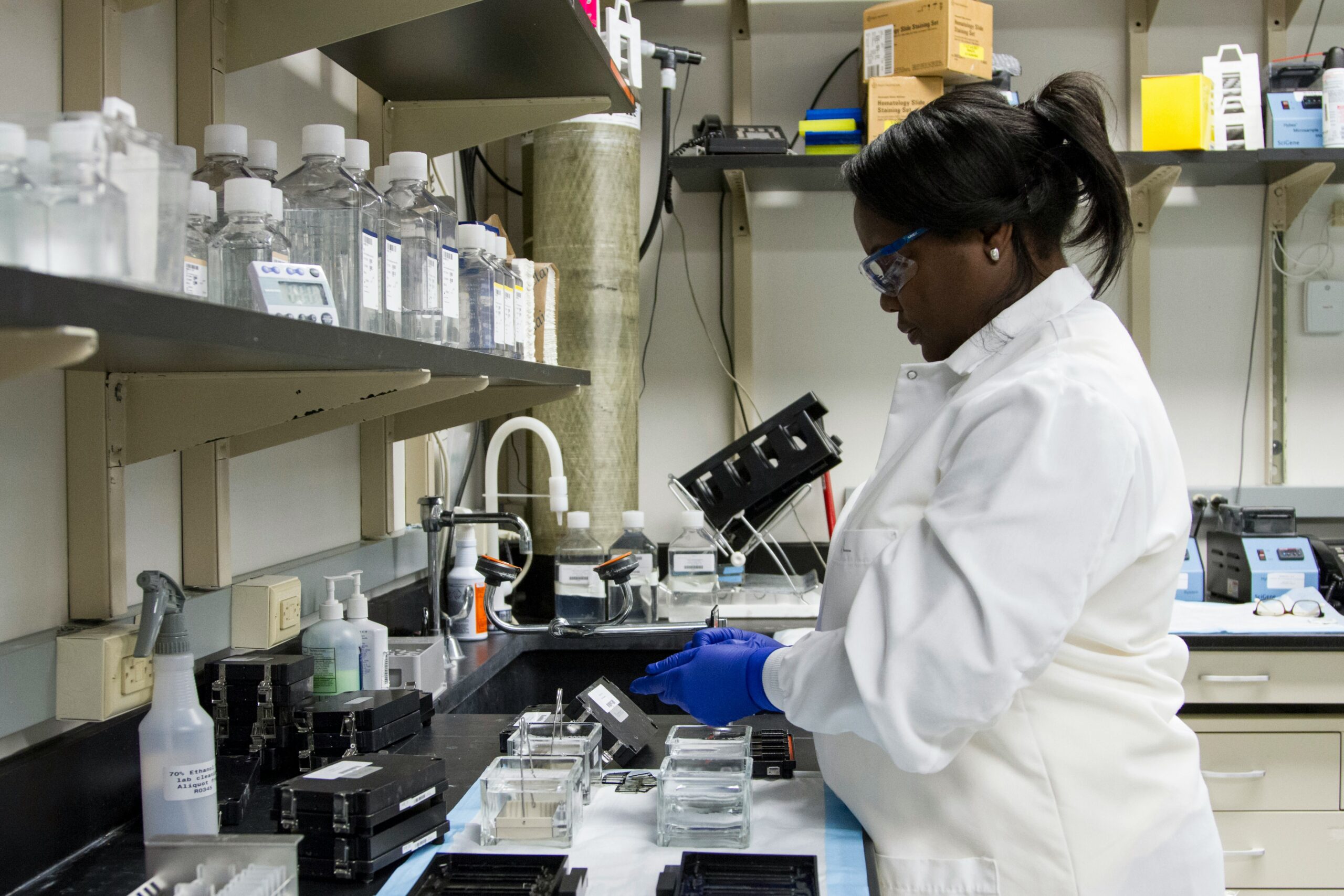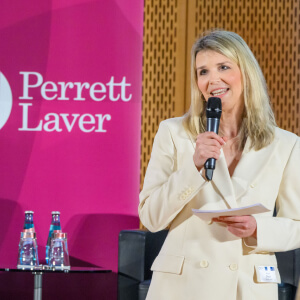- English
- DEUTSCH
- SPANISH
- FRENCH




Arabella: Executive search is fundamentally about more than just filling roles – it’s about upholding critical values in leadership selection. In recent years, we’ve observed a concerning trend of diminishing focus on Equity, Diversity, and Inclusion (EDI) across various sectors. This makes our role even more pivotal. We’re not just identifying candidates; we’re championing a more inclusive approach to leadership recruitment.
Our approach goes beyond simple representation. We’re committed to ensuring that the women we place in leadership roles aren’t just hired, but are set up for long-term success. This means providing comprehensive support throughout the entire recruitment and transition process. We create space for candidates to explore opportunities from multiple angles, address personal considerations – especially in complex scenarios like international moves – and critically, we work to bolster their confidence.
Sinéad: To add to Arabella’s point, our work is about sustainable leadership. It’s not just about the number of women we place in senior roles, but about their sustained success and impact within organisations. We’ve developed a holistic approach that focuses on long-term achievement, including proper onboarding, induction, and ongoing mentorship.
Sinéad: Over time, Perrett Laver has transformed significantly, with the majority of senior management roles now held by women. This isn’t by accident, but through intentional culture-building. We’ve created an environment of inclusivity and support that enables women to not just participate in leadership, but to excel.
Arabella: Our core values of collaboration, collectiveness, and mutual support have been instrumental. We’ve implemented role modelling from all leaders, which has been crucial in building a strong pipeline for future women leaders. Crucially, our reputation for advancing EDI has become a key reason why many organisations choose to work with us.

Arabella: Our approach to workplace culture has evolved significantly. We’ve recognised that supporting leaders means supporting their entire life experience. We’ve enhanced support for parents and carers, introduced more flexible working arrangements, and implemented improved benefits like enhanced maternity pay.
Sinéad: It’s about understanding that professional success isn’t achieved in isolation. By creating a more holistic approach to work, we’re enabling our colleagues – especially women – to balance their professional aspirations with personal responsibilities more effectively than ever before.
Arabella: Ultimately, our responsibility extends far beyond recruitment. We’re actively shaping the leadership landscape, ensuring that diversity remains a priority. By supporting women leaders, advocating for EDI and fostering inclusive workplace cultures, we’re contributing to more equitable and effective leadership across all sectors.
Sinéad: The knowledge that each leader we support is breaking new ground. We’re not just filling positions – we’re opening doors, challenging existing paradigms and creating pathways for future generations of women leaders.

At Perrett Laver, we believe that only with diversity at a senior level can organisations truly understand the perspective of excluded communities and dismantle barriers to success and participation at a grassroots level.
That is why we have worked with Sport England and UK Sport since 2018 to create the Diversity in Sport Leadership programme, designed to prepare leaders from the private sector for governance roles in some of the country’s leading sporting organisations.
This programme works to identify and develop a network of senior, experienced candidates from a range of backgrounds, including women, people from black, Asian and other ethnically diverse backgrounds, disabled people and LGBT+ people.

Across multiple sports boards
Appointees coming from black, Asian and other ethnically diverse backgrounds
Appointments made
Appointees with a declared disability
We have also been supported in the delivery of the project by a consortium of expert partners, including RimJhim Consulting, Birkbeck University of London, Sport and Recreation Alliance, Women on Boards, Activity Alliance and Stonewall.
Jennifer Thomas is one leader who has been through the programme which allowed her to take up a board position with England Netball.




Jennifer went on to say, “The Diversity in Sport Leadership programme has given me the opportunity do that. It has allowed me to transfer my professional experience into a governance role and begin to drive the change I want to see in sport.”
“The board team at England Netball really encourages a hands-on approach and there have been opportunities to work on some amazing projects. I have offered myself as a sounding board for diversity and inclusion, and hopefully given some insight that will help drive diversity throughout the organisation.
I would highly recommend that any private sector leaders with an interest in sport pursue Sport England, UK Sport and Perrett Laver’s Diversity in Sport Leadership programme.”


Tim continued, “The sporting world is now going through an important period of education and action on diversity and inclusion, and initiatives like the Diversity in Sport Leadership programme from Sport England and Perret Laver are an essential part of that.
The programme has allowed us to bring in exceptional leaders from the private sector who have helped us challenge our processes and create structures and systems that are inclusive to all. Sport England, UK Sport and Perrett Laver’s programme has already broken down so many barriers to entry in sport, and we would encourage any leaders and organisations to engage with the programme to continue driving positive change.”
Arabella Chichester and Dr Sinéad Gibney will be appointed as Global Senior Partners and will be responsible for the long-term strategic development and accelerating commercial growth of the company. Tom Weinberg will take on the role of Global Managing Partner and will oversee the professional management of the organisation, ensuring that it continues to be a profitable and growing company and delivers on its core operational commitments.

Arabella has been at Perrett Laver for twelve years and has been Global Head of the Social Impact and Environment Practice for the last eight. Arabella scaled and diversified Perrett Laver’s Social Impact and Environment Practice to become one of the leading advisors in the sector.
Sinéad steps up into the new position having been Managing Partner for Ireland and Joint Managing Partner for Europe. During her ten years at Perrett Laver, she established and led the firm’s operations in Amsterdam and Dublin, while continuing to grow Perrett Laver’s Research, Technology and Innovation, and Higher Education practices across Europe.
Tom comes to the role having been at Perrett Laver for twelve years as Joint Managing Partner for the UK and Global Head for Knowledge and Innovation Economies. Tom has grown Perrett Laver’s work across Latin America and the Middle East, co-led Perrett Laver’s largest region through a significant period of growth and spent two years in the US helping establish the company’s first office there.
On their appointments, Arabella, Sinead and Tom said:
“Being appointed to these roles is an immense honour. This is a very exciting time for Perrett Laver, with our clear mission, we have a unique opportunity to drive transformation in the sectors we serve, and position Perrett Laver as a catalyst for positive global change. Our vision for Perrett Laver centres around people, and our passionate, motivated, and entrepreneurial colleagues have been critical to our success thus far. As we move forward, we remain committed to championing our values of equality, sustainability, global collaboration, diversity, and inclusion, which lie at the heart of everything we do. We look forward to collaborating and working alongside colleagues worldwide as we embark on the next phase of the Perrett Laver story.”
Celebrating the announcement of the new leadership team, Simon Laver and Dan Perrett, Co-Founders of Perrett Laver said:
“With their dynamic expertise and vision, Arabella, Sinead, and Tom are well-equipped to chart an exciting course for the future of the company. This transition represents a pivotal milestone in our firm’s history, and we are both deeply gratified to be a part of it. We recognise that as leaders in the business of finding talent, our new Global Leadership Team will have a profound impact on society as a whole, and we are proud to have entrusted this responsibility to such an exceptional team.”
The announcement of the new leadership team coincides with an impressive performance over the past 12 months including the company’s recent geographical expansion and key hires in North America, Asia Pacific, Europe, and Africa.
Perrett Laver will continue to support key organisations in sectors including higher education, social impact and the environment, research, technology and innovation, schools, arts and culture, government, and sport.



The first thing I would say is that my job is incredibly diverse, and my focus depends on the project that I am working on at the time. As a result, my role is varied and I find it exciting to work across the academic, private and public sector and develop my understanding of how they all interact.
Something that brings me joy in my role is being able to hear from people who are genuinely passionate about their sector and how they can make a substantial impact. When interviewing for appointments in the Higher Education sector, for example, I am inspired by how potential future leaders are driven by issues such as student wellbeing, sustainability, responsibility and how they can bring lasting change to the institution. I love to see them navigate how they can address issues that are outside their personal career trajectory.
I am also pleased that we are moving away from the ‘ivory tower’ idea of academia. Science is no longer seen as an inaccessible field, and candidates applying for scientific roles now need to have that holistic understanding of their role outside of the academic part of it, to see real success.
I am tempted to say that women in science should dare to have confidence in themselves, but that suggests the new generation of women in science do not already believe in their own capabilities. That’s not the case at all. Women trying to break into the sector are tasked with demonstrating that they are just as ambitious, talented and bold as their male counterparts.
It’s also important that we break down the stigma that there aren’t abundant opportunities for women in science. In my opinion, the opportunities exist, but it’s vital that women are supported to take full advantage of them.



Identifying potential is the most important thing when seeking to increase the number of women appointed in leadership roles in the current science sector. It’s about acknowledging an individual based on their potential growth and what unique skills and perspective they could bring to a role, rather than reducing them to a CV. Otherwise there’s a risk of alienating strong candidates and favouring applicants, often male, who arguably have a better track record on paper. Sometimes the vision and ambition that an individual can bring to a role can have a bigger impact than relevant work experience.
Representation also plays a significant role in attracting more women to top jobs. If there is not a strong female presence in leadership positions, other women earlier on in their career will find it hard to envisage themselves at that level without the necessary role models. Seeing women at the top can also help to break down the mental barriers that girls may have when considering whether they are capable of a role in science, so it’s crucial that there is a pipeline of talent from beginning to end, and it’s always a personal consideration when identifying candidates in science.
A great example of an inspiring woman with a scientific background who I have recently helped to appoint is Professor Annelien Bredenoord, the new Rector Magnificus at Erasmus University in Rotterdam, who comes from a background of medical ethics. It’s so encouraging to see a young, ambitious woman in such a key role at the university and I am looking forward to witnessing the positive change I’m sure she will enact at the Institution.
Another exciting recent appointment is Professor Petra de Weerd-Nederhof, who has become the Dean of the Faculty of Science at Open University. It is notoriously rare to see a woman in the position of Dean of Science, so it’s been a pleasure to help Petra with this accomplishment.
Moreover, we had the pleasure to support the appointment of Priscilla Chomba-Kinywa as Chief Technology Officer at Greenpeace International. Priscilla has a background in Business Computing and has done wonderful things in the non-profit sector helping organisations to increase their impact through information technology and digitalisation. This appointment is important because it showcases the contribution women from the Global South can have in Executive Boards of world-renowned organisations.
While progress has been made in the industry in terms of greater representation, we can’t rest on our laurels and must continue to build on the groundwork that has already been laid.
I have always had a passion for science. Whilst I principally studied psychology and neuroscience, I have worked in institutes alongside scientists from various disciplines trying to figure out the solutions to a huge range of extraordinarily complex issues. This experience has really helped me to hone my skills in problem solving.
As a PhD student, I have also had first-hand experience working within a Higher Education institution. When I left my studies, I thought that my job opportunities were limited to the academic sector, but in reality, there are a whole host of opportunities for PhDs, including roles in executive search. I would encourage fellow female academics to consider the skills they can bring to the table and how they can apply them across a broad range of sectors – you might find your calling somewhere you least expect it!
As a woman of STEM background, it has been incredibly rewarding to see the progress already made and I am proud of my contribution to changing the narrative of what it means to be a leader in the science sector. Whilst there is still more to be done, it’s important we take a moment to celebrate the extraordinary women and girls in science paving the way for a more representative future.
Perrett Laver is dedicated to supporting the appointment of leaders in purpose-driven organisations that seek to change the world for the better. Nicole started her role in the company’s new Berlin office on 1st September.
A German national, she joins Perrett Laver from the Council for European Studies at Columbia University (CES), where she had served as Executive Director and Founder of the journal EuropeNow since 2015.

In her role, she oversaw the renowned annual International Conference of Europeanists, the prestigious World Society Foundation Global Fellowships, the Mellon-Dissertation Completion Fellowships as well as numerous research networks and publications. In Germany, she worked with the Georg-Simmel Center for Metropolitan Studies (Humboldt University of Berlin) as Chair of COST Action 18204 and with the Berlin Social Science Center (WZB) as Interim Head of Personnel Development and Research Funding.
Nicole is the author of The Politics of Prostitution in ‘Berlin Alexanderplatz’ and the editor of The Many Voices of Europe: Mobility and Migration in Contemporary Europe.


Nicole will be part of the Perrett Laver Region Europe, under the leadership of Josephine Scholten, who spoke of Nicole’s appointment, “As Country Managing Partner and the latest exceptional talent to join the offices in the DACH region, we expect Nicole to leverage her extensive knowledge and network, focusing on leadership development across a range of sectors including higher education, research, innovation and social impact sectors.”
Recognising her landmark appointment, Simon Laver and Dan Perrett, Co-Founders of Perrett Laver said: “We are very excited to welcome Nicole as our newest Partner. She brings a wealth of experience and vision to the role and her appointment is indicative of our broader goal of enhancing our offering in Europe. We look forward to seeing Nicole expand on our work in Germany, Austria and Switzerland, supporting organisations having a transformative impact on our world with diverse and visionary leadership.”
I lead Perrett Laver’s Sports Practice – a phenomenal team made up of creative research colleagues and skilled project managers. The practice was founded with a focus on the unique social impact of sport, motivated by its ability to nurture potential, tackle inequality, and generate a sense of pride and cohesion.
We work with a range of organisations, from grassroots to high performance, to appoint leaders at executive and non-executive levels. We also deliver large scale leadership campaigns, such as our strategic partnership with Sport England and UK Sport, through which we have supported and stewarded over 100 candidates from underrepresented groups into leadership roles.
We have also worked on several advisory projects, particularly focused on enabling inclusive recruitment and sharing best practice in the space.


Our work with Sport England uses a unique blueprint to tackle issues of underrepresentation in leadership in the sports sector. We have created a dynamic network of over 250 candidates whom we offer sector specific training and development opportunities. The purpose of this network is to support candidate’s readiness to step onto board positions, and enable connectivity such that highly qualified individuals are introduced to relevant boards at opportune moments.
Over the last three years, we’ve made over fifty appointments to national governing bodies, partnerships, and charities. More recently, our focus on supporting county level organisations in sports such as football, cricket, yachting and hockey organisations has extended this to over 100 appointments. These appointees are doing fantastic things across the sector – and having very tangible impacts on their boards.
We also offer advisory support to organisations Sport England and UK Sport fund at times when they are about to run a recruitment campaign, ensuring they are abreast of best practice and well positioned to attract talent.

Sport has traditionally been a male dominated industry – how can recruiters diversify hiring practices, and what more needs to be done to increase inclusive leadership in sport?
It is true that the sports sector is still very male dominated – but we can see first-hand that change is happening at every level. In 2020, nearly two years after we started our work with Sport England and UK Sport, for example, we conducted a board audit which showed that female representation on boards had reached 43.5%. There is obviously still some way to go before we see gender parity, but there has been a visible increase nonetheless.
From a recruitment perspective, it is crucial to invest sufficient time and resources into every appointment. There will be things to consider around, for example, advert placement and language, but critically investing time also includes ensuring efforts to look beyond immediate networks. I would also always encourage organisations to fully interrogate their strategic needs when designing a brief, really questioning what skills are essential, desirable, and transferable. Organisations need to make sure that they are challenging themselves and assumptions about what the next leader will look like, throughout the process, from advertising to shortlisting and of course final interviews.
The sector also needs to think beyond recruitment to consider onboarding, retention and the continued development of individuals that have transitioned into leadership roles. We have seen a lot of important and impressive appointments over the last couple of years, but organisations must continue to hold themselves accountable and make sure that they create an inclusive culture that allows these talented individuals to thrive and contribute.
On July 28, the Commonwealth Games kicks off bringing together elite, youth and paralympic competition. How have you seen sport and sport leadership become more inclusive during your career?
Over the last year and a half there has been a huge focus on cultural and ethnic diversity, particularly in the wake of global protests around the murder of George Floyd and more recently Azeem Rafiq’s testimonies. Such incidents have caused a lot of introspection. However, we must be alert to knee jerk responses and ensure that change is authentic.
There are different challenges for different sports. For some, priorities may sit around growing participation and ensuring that the sport is open for all at a grassroots level. For others, it may be that the diversity of athletes and players is not being replicated in other areas of the game, such as coaching or leadership levels.
There are also significant issues around behaviour and cultures on the field, the locker rooms and amongst fans. Despite these challenges, I do feel positive about the future as we see tangible changes happening in education, processes, and representation.
It would be hard not to talk about changes around inclusion without mentioning the phenomenal growth of women’s sport too. It is such an exciting era for those rising stars, and likewise disability sports are attracting the attention they’ve deserved for some time.


In advance of the Commonwealth Games, Perrett Laver will attend the Beyond the Games conference discussing the role of sport in addressing the UK’s social and sectoral issues.
How do you think sport can make a positive influence in society today?
Sport captures people’s imagination and hearts. In its rawest form, it shows us what humans can accomplish, and what boundaries we can overcome, whether that’s in recreational or competitive sport.
A strong sporting infrastructure supports the nation’s health and wellbeing. It is a great tool for education, and indeed promoting development in other respects. It is also a great tool for social cohesion, bringing people together not just in their own teams or clubs, but across different leagues and competitions on the national and global stage.
Finally, where do you see the future of sport leadership headed in the next ten years?
In a space that has been heavily impacted by the pandemic, and continues to recover from it, sport needs people who can think commercially. It has proven to be a sector that, when needed, can be fleet of foot and innovative. However, it will continue to need people who can drive revenue as public funds continue to be squeezed. This may well be through increasing participation and engagement but can come from looking at media rights and new opportunities in OTT, for example, as well as examining other potential commercial partnerships and investment opportunities. Being digitally astute in this journey will be important, not just for operational efficiency but to capitalise on the opportunities a better understanding of data affords.
Over the next decade, I’m sure (indeed determined!) that we’ll also be seeing more diverse and innovative leaders.
We are already starting to see changes in where leadership comes from, both in terms of lived experience and creativity in the models and profiles shortlisted. It will be imperative that leaders, regardless of background, are inclusive through their own style and the culture they seek to instil, demonstrating themselves to be champions for diversity and celebrate difference.
Finally, leaders are becoming increasingly aware of the social value and responsibilities of sport. Organisations are already better at articulating and engaging with their purpose and recognising the need to drive corporate social responsibility (CSR). This global citizenship and relevance will serve to capture a wider audience and is realigning people with sport in new ways. Leaders will need to recognise how important CSR is as a direction of travel for any business, and be passionate about sport’s particular position and potential with regards to tackling and promoting consciousness around global challenges
In a post-pandemic world, work and home life have become more intertwined than ever before, with hybrid working now the new normal.
While working from home has its benefits, it can also at times lead to feelings of disconnectedness between employees and a company’s broader purpose or mission. It has also led to a rise of ‘e-presenteeism’, as workers feel unable to switch off.
Mental health and its importance in the workplace has become an increasingly prevalent issue in recent years, with work-related stress, depression or anxiety accounting for 50% of all work-related ill health in the UK in 2020-21. Put simply, if colleagues do not feel supported in their mental health, they are not able to perform to the best of their abilities, hindering a business’ ability to unlock its full potential. Furthermore, colleagues that have positive mental health contribute to a positive working culture, making a company a desirable and enjoyable place to work.
There are many initiatives and actions that organisations can adopt to ensure colleagues feel that there is support if they need it. At Perrett Laver this comes in many forms – from our Vitality Healthcare plan which offers access to counselling services, training from the mental health charity Mind for line managers, a subscription to the meditation and relaxation app Calm, access to Mental Health First Aid trained staff – to smaller but important offerings such as a weekly fruit delivery.
Ultimately, however, destigmatising mental health and empowering colleagues to speak up and get the help they need is the most important thing an organisation can do. This can be achieved by promoting an open culture of transparency and trust, whereby individuals feel able to speak to honestly and openly with someone in their network about their mental health and ask for support.




As demand for hybrid work options increases, it is important that businesses are agile and adapt how colleagues can be supported in different ways. This might include moving facilities and resources online so that they are accessible for all or allowing flexible working hours to encourage employees to make the most of their leisure time.
There are many aspects of working at home that support mental health. This includes enjoying more time with family and allowing more flexibility for people that have responsibilities at home, such as parents or carers. However, there are also aspects that can be detrimental, as presenteeism prevents people from ‘switching off’ or stepping away from their work, consequently putting pressure on their mental health.
It is vital that businesses create an environment where employees feel that they belong, that their opinions are valued and that they are part of a broader purpose. If colleagues do not feel connected to others in a virtual setting, it is easy to lose that sense of purpose and motivation, and question why they are doing the work they are doing.
It’s also important that conversations are not always about business. Informal chats with colleagues are often under-valued but are a great way to keep co-workers connected on a more personal level.

Organisations are starting to embed mental health policies into how they describe their working culture and vision. All organisations that Perrett Laver works with are purpose-driven, but there is a new emphasis being placed on ensuring that the employees of those organisations are also directly feeling and benefiting from that purpose.
More specifically, we have seen a greater emphasis on equality, diversity and inclusion within organisations. If an organisation is not driving an inclusive culture, individuals can feel excluded, with their mental health suffering as a consequence. If an organisation does not seem as though it is recognising them or allowing them to bring their whole selves to work, it can lead to a sense of loneliness and isolation.
Physical wellbeing has a direct knock-on effect on mental health. With the pandemic heightening people’s awareness of their physical wellbeing more than ever, organisations must give people the time they need to look after themselves physically which will have a positive ripple effect on their mental health.
Further to physical wellbeing, the pandemic spotlighted nervousness around finances as the economy was brought to a standstill. We have organised financial education training for Perrett Laver employees at different stages of their career, to give financial resilience and wellbeing the attention it deserves as a marker of an individual’s mental health.
The world has been through a number of monumental shifts in the last few years which has resulted in people being more compassionate to one another. Whilst there were silver linings, inequalities have become more transparent and lockdowns have triggered feelings of isolation, taking its toll on individuals’ mental health. Ultimately, it’s crucial to ensure that employees know support is available and how they can access it.


